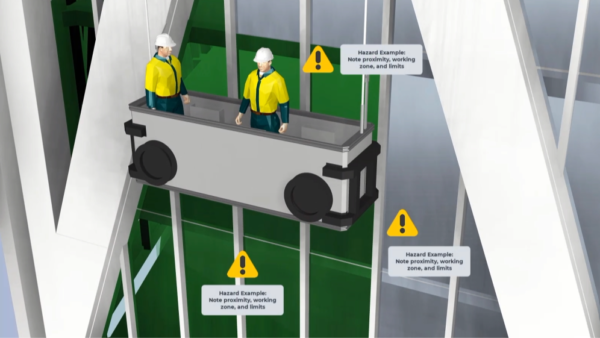AI is an aggregative term used to describe how machines can be trained to imitate human cognitive functions, including spotting patterns, learning from experience and understanding images, writes Ibrahim Imam, co-founder of PlanRadar.
AI in construction involves using these technologies to make building sites safer, reduce waste and boost efficiency. Moreover, if you have conducted thousands of site audit reports, a building AI solution could crunch through all the data to make a series of recommendations and help improve future projections.
While the technology is still relatively new and not yet widely utilised, its market demand is expected to grow. Indeed, one forecast reckons that the building AI market will reach £3.5bn by 2026.

One of AI’s greatest strengths is its ability to explore different variations of a model to find the best option.– Ibrahim Imam
What are the potential uses for AI in construction?
Generative design: one of AI’s greatest strengths is its ability to explore different variations of a model to find the best option. For instance, AI could take a BIM model and explore tens of thousands of design changes to make a design safer and more stable, or simply cheaper and faster to build. While it would require months for a human to explore all these possibilities, an AI engineering programme could so in hours.
Generative design has already been used in manufacturing, and companies like Alice Technologies are now trying to bring it to the construction industry too.
Project management: even with skilled project managers in charge, 34% of construction projects run over budget in the UK and 41% of projects are delayed. However, academic research into AI forecasting algorithms has proven highly accurate in estimating cost overruns of projects.
Project managers could use AI-enhanced PPM software to identify possible delays to the construction process by comparing the physical building progress to a digital replica of the building that is represented in a BIM model. All parts of the supply chain could then be automatically informed and revise their projections to manage time and resources more effectively.
Automated fault detection: AI is very effective at analysing historical data and can use these insights to create likely forecasts of future events. While the construction industry is still waiting for a programme that can do this, the data that apps like PlanRadar collect could feasibly be used to train a machine to spot patterns in defects, and eventually predict when certain materials will become damaged.
Robotics: AI construction robotics represents an exciting possibility for saving time and reducing risk on construction sites. While we are still a long way from a world of autonomous robot bricklayers, firms like Built Robotics are already providing bulldozers and excavators that can be given defined tasks and work alone.
This kind of technology could enable projects to progress at a much faster pace. These innovations will be especially beneficial for projects in remote locations that are difficult to get workers to: instead, remote diggers could work 24/7 clearing sites and get the work done much faster.
AI-enhanced drones: drones are already being used on construction sites to give builders new perspectives on projects. Moreover, the images and measurements collected by drones via remote recordings and 360 degree scans can provide the data to enable AI programmes to track the progress of a project against the original digital plans.
Now, firms like Skycatch are training drones to ‘understand’ what they are seeing. The applications here are enormous, from spotting dangerous activity to monitoring productivity levels: intelligent drones could help make sites safer, more efficient and productive.
Looking ahead
At present, AI in construction remains a relatively new technology, however, that shouldn’t stop us from thinking about what might be possible one day. Even smaller companies can prepare to benefit from future developments in AI by ensuring that their project data is consistently captured and safely stored. If the construction industry is to continue to thrive in the digital age, it must be open to adopting the capabilities of AI technologies.
Ibrahim Imam is the co-founder of PlanRadar, a leading SaaS solution for digital documentation and communication in construction and real estate projects. The technology is used for construction documentation, defect and task management, certifications, maintenance, and handovers.
PlanRadar is a partner of the Digital Construction Summit 2020 and is taking part in the webinar, Communicating digital solutions to site teams effectively, at noon on 30 September; register here: https://us02web.zoom.us/webinar/register/WN_B_lx_GcOTyajP-NrjWa4WQ
Image:116743038 © Dzmitry Ryzhykau | Dreamstime.com











